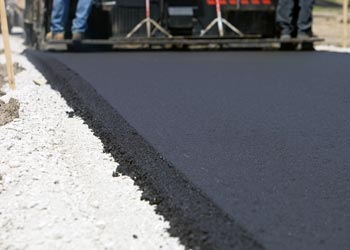Hot Mix Asphalt Paving: The Ultimate Option for Commercial Parking Lot Restorations
Hot Mix Asphalt Paving: The Ultimate Option for Commercial Parking Lot Restorations
Blog Article
Exploring the Ecological Benefits of Warm Mix Asphalt
The application of Warm Mix Asphalt in framework jobs provides an engaging case for lasting advancement and ecological stewardship. By delving into the elaborate details of its production procedures and the ingenious use of recycled materials, a deeper understanding arises of exactly how this innovation exceeds simple surface area applications. The environmental advantages of Hot Mix Asphalt expand far beyond preliminary impressions, supplying a nuanced perspective on how this material can lead the way for a greener future.

Decreased Greenhouse Gas Emissions
The manufacturing procedure of Hot Mix Asphalt includes warming the combination of aggregate and asphalt binder to high temperature levels. By incorporating reclaimed asphalt pavement and recycled asphalt roof shingles into the mix, the demand for virgin materials is reduced, leading to energy financial savings and decreased emissions associated with removal and processing.
Research studies have actually shown that Hot Mix Asphalt pavements have a smaller sized carbon footprint over their life process contrasted to various other sidewalk options. The toughness and recyclability of Hot Mix Asphalt further enhance its environmental advantages by minimizing the requirement for frequent upkeep or replacement, consequently preserving sources and lessening exhausts linked with repair activities.
Energy Performance and Preservation
The manufacturing process of Hot Mix Asphalt not only minimizes greenhouse gas exhausts but additionally contributes considerably to power effectiveness and conservation efforts. Energy effectiveness is a vital benefit of Hot Mix Asphalt manufacturing compared to other pavement kinds. The sturdiness of Warm Mix Asphalt lowers the regularity of upkeep and repair, leading to long-term power savings.
Lasting Pavement Solutions

One key element of sustainable sidewalk solutions is using recycled products such as reclaimed asphalt pavement (RAP) and recycled asphalt roof shingles (RAS) By including these materials into the asphalt combinations, the demand for virgin sources is minimized, causing reduced power usage and greenhouse gas discharges during manufacturing. In addition, the reuse of these materials assists draw away waste from garbage dumps, adding to an extra round and sustainable economic climate.
In addition, lasting sidewalk remedies concentrate on enhancing pavement style to improve performance and longevity. Strategies such as warm mix asphalt useful link (WMA) and stone mastic asphalt (SMA) enhance the longevity and durability of pavements, minimizing the requirement for regular fixings and substitutes. By applying these ingenious techniques, facilities developers can produce pavements that not just satisfy high-performance criteria however also minimize their environmental footprint.
Minimized Environmental Impact
Warm mix asphalt, in certain, provides a number of benefits that contribute to lowering the total ecological impact of road facilities. One key element is the recyclability of asphalt, which can be reused multiple times without jeopardizing its high quality - find here Regrading.
Furthermore, the production of hot mix asphalt discharges lower levels of greenhouse gases compared to various other pavement materials, making it an extra eco-friendly alternative. The power effectiveness of asphalt plants has actually also boosted over the years, resulting in lowered gas consumption and lower exhausts. Furthermore, the smooth surface of warm mix asphalt reduces rolling resistance for automobiles, resulting in reduced fuel consumption and decreased air pollution from vehicle discharges.
Contribution to Climate Adjustment Mitigation
Hot mix asphalt plays a crucial duty in mitigating environment modification via its sustainable buildings and lowered ecological impact. One substantial payment to environment adjustment reduction originates from the power efficiency of warm mix asphalt production. Contrasted to other sidewalk options, the manufacturing process for warm mix asphalt takes in less energy and emits reduced levels of greenhouse gases, hence reducing its total carbon impact.
Furthermore, warm mix asphalt's capability to reflect sunlight, called albedo, assists in decreasing metropolitan warmth island effects. By lessening warm absorption and retention, hot mix asphalt sidewalks can lower the need for cooling in urban areas, as a result decreasing greenhouse gas exhausts more info here connected with energy consumption for cooling purposes.
Additionally, the toughness and recyclability of hot mix asphalt further enhance its environment change mitigation capacities. Regrading. The lengthy life-span of asphalt sidewalks lowers the demand for frequent repairs or substitutes, inevitably lowering the carbon emissions connected to roadway maintenance activities. The recyclability of asphalt products decreases the demand for virgin resources and decreases the ecological influence of sidewalk building and construction, lining up with sustainable methods for climate adjustment mitigation.
Conclusion
To conclude, the environmental advantages of Hot Mix Asphalt show its substantial contribution to reducing greenhouse gas emissions, conserving energy, and decreasing ecological impact. This sustainable sidewalk option aligns with environment modification reduction initiatives, promotes source conservation, and boosts facilities development. By utilizing recycled materials, energy-efficient manufacturing procedures, and sturdy style, Hot Mix Asphalt plays a crucial function in cultivating a more environmentally friendly method to infrastructure building and construction.
The production procedure of Hot Mix Asphalt involves heating up the blend of accumulation and asphalt binder to high temperatures. By including redeemed asphalt pavement and recycled asphalt roof shingles right into the mix, the need for virgin materials is reduced, leading to energy financial savings and decreased emissions connected with removal and handling.
One secret facet of lasting pavement remedies is the use of recycled products such as recovered asphalt sidewalk (RAP) and recycled asphalt shingles (RAS) Techniques such as warm mix asphalt (WMA) and rock mastic asphalt (SMA) boost the longevity and durability of pavements, minimizing the need for constant repair services and replacements. Contrasted to various other sidewalk options, the manufacturing process for warm mix asphalt takes in much less power and emits reduced levels of greenhouse gases, hence lowering its overall carbon footprint.
Report this page